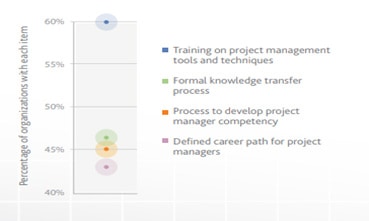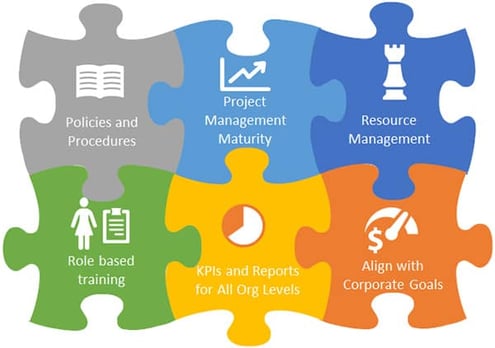Functions of a Project Management Office
The Project Management Office’s (PMO) mission is to make projects successful by providing the structure needed for an excellent project management approach.
Is Your Project Management Office (PMO) a Vital Part of Your Organization?
The Project Management Office's (PMO) mission is to make projects successful by providing the structure needed for an excellent project management approach. There are two types of PMOs: centralized and decentralized. Centralized PMOs are enterprise-wide and decentralized PMOs focus on a program or project. Regardless of PMO type, the major function is to provide decision support information for projects. The Project Management Institute (PMI) Program Management Office Community of Practice describes the PMO as a strategic driver for organizational excellence, which seeks to enhance the practices of execution management, organizational governance, and strategic change leadership. According to recent studies, organizations that have a PMO function are more likely to have project success, which has led to a rise in PMOs.

Primary Functions of a PMO:
The major function of the PMO is to help project teams manage and execute their projects successfully! Whether starting a new PMO or reviving an old one, the first step is to create a mission statement and a vision.
Example PMO Mission Statement:
"The Unanet Project Management Office (PMO) supports an effective project management methodology, empowering our enterprise to deliver projects on-time, on-budget, and with the highest possible quality meeting and exceeding our customers expectations."
Example PMO Vision:
“To make Unanet a recognized leader in delivering projects that exceed customer expectations and improve our profitability and efficiency.”
To fulfill that mission and vision, the PMO will need to perform the following functions:
- Create and maintain policies and procedures
- Policies should establish best practices for your organization
- Assure that the policies and procedures help the teams be successful
- Provide standardization across the enterprise (Level 3 Maturity)
- Have a repository giving all stakeholders access to current documents
- Create a feedback loop to check for adherence
- Have a self-audit plan and corrective actions
- Embrace project management maturity - Since project management depends on the strategic alignment of people, processes, and tools, it only makes sense to concentrate on the level of competency of each of these attributes throughout your capability evolution. Engineering and professional services organizations are all on different journeys as it pertains to capability evolution. Increase in maturity equals increase in successful and predictable outcomes.
- Resource Management - People are a company’s biggest investment and in turn it is the largest revenue generator for service-based companies. Resources should be managed during the entire project lifecycle: starting a proposal, project initiation, execution, and closeout. Enabling projects and programs to measure the utilization and demand of resources is critical. Below are a couple of questions you should be able to answer during the resource management process. A PMO that supports a strong resource management discipline will be a major differentiator for winning new business and executing existing projects.
- What utilization do you need to be profitable?
- What utilization should you aim for to avoid burnout?
- Understanding billable and non-billable utilization?
- Project probability in people forecasting to more accurately understand both billable revenue and utilization
- KPIs and reporting for the projects and the enterprise at large - KPIs measure activity that reveals how a business is performing against its goals. KPIs measured against a specific target or benchmark is an indicator of good or bad performance. If a measurement of activity does not directly influence the goals of the business, then it is not a KPI, it is a metric. The business may want to measure many metrics but not all metrics are Key. A KPI is only as valuable as the action it inspires. The PMO should assist the business in defining KPIs that drive the success of projects, programs, and portfolios. The PMO can also be a major player in the communication of the KPIs through standard dashboards and reports. Communication is extremely important as succinct, clear, and relevant (current) information is much more likely to be absorbed and acted upon. One way to evaluate the relevance of a KPI is to use the SMART criteria. The letters stand for specific, measurable, attainable, realistic, time-bound. A proactive PMO will help establish SMART KPIs for the teams and executives.
- Role-based training on policies, procedures, and tools is a critical activity for the entire project team. Understanding the basics of the policies and procedures as well as the impact on other teams helps stakeholders understand their role as well as what other groups are doing. Project management discipline and competency training is necessary and PMOs/Organizations that recognize this will reap great rewards. Project management is a mix of learned skills, experience, and basic leadership capabilities. Project managers that are exposed to skills and role-based training are more likely to have successful project outcomes. Organizations will attract great project managers if they recognize the importance of the project management discipline and have a training program, provide a career path, and have established project management processes and procedures.

- Align with Corporate Goals - The PMO, must embrace the overall culture and corporate strategy to gain traction in the organization. Effective PMOs break down silos and help organizations execute with a common purpose enabling project teams, functional organizations, and executives to be in complete alignment. The goals and mission of the PMO should be aligned with corporate goals. The more successful the PMO, the more influence it will have. As the PMO takes on the role of “trusted advisor” and “project execution specialist” the more support they will gain from the C Suite. The more support they get, the more likely your PMO will help shape strategy and become “best in class."

To learn more, download our white paper, "Benefits of Maturing Your Project Management Discipline."